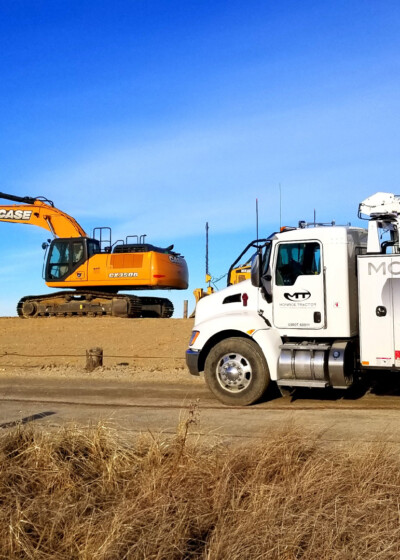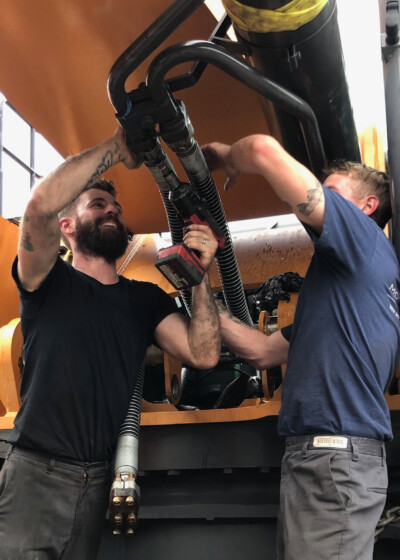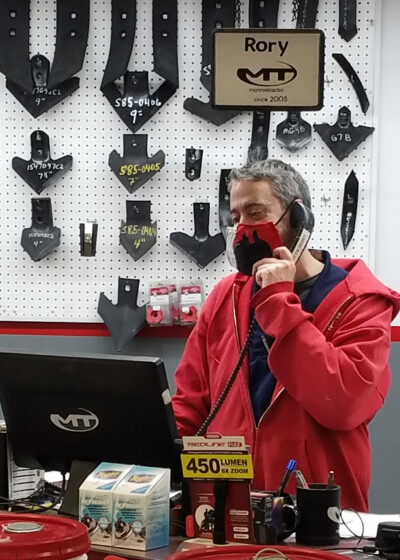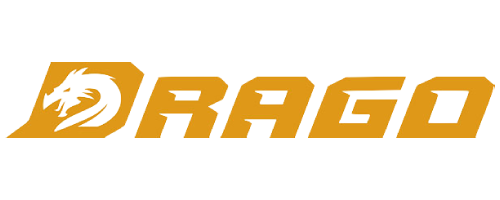Monroe Tractor founder, Henry Hansen’s legacy lives on.
Successful companies are branded — that is, they are given a set of distinctive characteristics that create an identity. Monroe Tractor’s brand mostly originated with company founder Henry Hansen.
When Hansen opened his small equipment supply house in Rochester, N.Y., in 1951, he frequently expressed his business principles in a pair of sayings. One was, “Where courtesy dwells, service excels,” which spoke to the constant need for a company to first treat customers as people, rather than as sources of revenue.
The second adage was a practical formula for retail success: “If you take care of the customer, the business will grow.” Unlike some companies that just talk about customer care, Hansen considered it more than a mantra. He practiced what he preached.

When the founder’s daughter, Janet Felosky, formally joined Monroe Tractor and developed into its next leader, she preserved both the sayings and the spirit of them. She did so for two reasons: First, they clearly work as rules for success and as branding markers. Second, they were reminders of a person who was much admired and respected by succeeding generations.
“It has been important for me to bear in mind the lessons that my father taught me,” said the chief executive officer of Monroe Tractor. Henry Hansen passed away in 2014, age 94, having seen the company progress well along toward a third generation of family leadership.
Hansen’s grandson, Chris Felosky, succeeded his mother in 2019 and reiterated his faith in the tone and brand established by the earlier generations.
“I will always treasure the words of wisdom that were imparted to me by my grandfather and I look forward to the continued guidance and direction from my mother,” he said.
However, it was left to the new president’s sister, Laura Wilkas, to more completely incorporate the brand into the culture of Monroe Tractor. When she joined the family business 10 years ago, Wilkas created this “brand promise:” We’re there to keep you doing your job.
“That is truly the foundation of who we are as a company,” Wilkas said. “When I came on board as director of marketing, it was determined that that was how we wanted to brand the company. How we build relationships and maintain them now isn’t much different from how relationships were built by my grandfather, and that’s through having good people who care about the customer.”
Wilkas added, “The culture and values that my grandfather held important 70 years ago were key to his growth then and still are key to our success today. Without them, we would not enable our people to make the right decisions.”
**
The overarching function of a brand is to give a company an unchanging value even as markets and product lines change. It gives a company the perception of stability even as an organization evolves and grows. So, it is that Monroe Tractor is seen by customers as a constant though it has changed dramatically over the course of 70 years.
Mike Celentano personally witnessed much of the change during almost five decades of working at Monroe Tractor. He retired in March as chief financial officer and vice president. Celentano said change, rather than stability, is what kept him at Monroe Tractor.
“There are many reasons why I stayed for 47 years,” he said. “One of the key reasons is that Monroe Tractor has never been content with the status quo. Whether it was Henry or Janet at the helm of today’s team, there was a constant endeavor to find ways to increase our sales and market share, grow the company, better serve our customers — either by taking on new product lines or growing the footprint of the company.”
He watched the number of company employees swell to 250 from the 22 when he joined the company in 1974. He also saw company branches proliferate across New York State and into New England, now totaling 14. Two major expansions occurred, one in 2008 and the other nearly a decade later.
The first was the decision to take over four Case dealerships in New York State belonging to the family of Henry Hansen’s brother, Stewart. Absorbing the other dealership locations grew the presence of the company, of course, but it also afforded Monroe Tractor a way to better serve customers.
“We were able to centrally stock parts in greater volume than ever before and support our customers as they used their machines just about anywhere in upstate New York,” Celentano said.
In other words, the company didn’t sacrifice anything to growth.
The second major expansion occurred in 2017 when Monroe Tractor acquired Case of New England, moving its equipment store brand into Massachusetts, Connecticut and Rhode Island. Celentano said “this was a significantly bigger challenge for us. New England was a whole new territory for us. We not only had to build Case product awareness, but also awareness of the Monroe Tractor brand. We had to rebuild from the ground up, including locating facilities.”
To effect such changes while maintaining a reputation as a reliable, caring business partner is no small job. It’s a team effort. Karen Long, who succeeded Celentano this year as CFO, said the company’s commitment to teamwork is notable. She attributes the unified purpose she finds at Monroe Tractor to weekly group meetings.
“These weekly group meetings, where groups of individuals work together as a team, solve problems or elevate problems up the chain so that leadership can solve them. They really put management’s money where their mouth is. It helps reinforce the culture the leadership team values and sets the tone for two other values, namely, to work hard and always do what is right. All of this is something that in my experience I find quite rare.”
Wilkas echoed Long. “At Monroe Tractor, there is no room for individuals who want to operate as an island. We are all about operating as a team.”
**
The Monroe Tractor brand is not the cumulative total of the many manufacturing brands it represents. Rather, it is a diverse product dealership with a singular focus. The flagship product line is Case and always has been. The Racine, Wis., manufacturer was there in the beginning when Monroe Tractor opened its doors as a distributor. Case remained a constant at Monroe Tractor after Case divided into two major divisions, agriculture machinery and construction equipment.
The split into divisions introduced complexity to Monroe Tractor.
When Case introduced construction equipment in the early years of the dealership, via its backhoe, Monroe Tractor responded by opening two agricultural product stores in farming communities and converting its original store into a construction products outlet. Expansion of both store product lines continues today.
Ag stores are located in Batavia, Canandaigua, Auburn and Adams Center in New York State and New Haven, Vt., and Derby, Vt. Construction stores are in Henrietta, Buffalo and Syracuse in New York State, Worcester and Woburn in Massachusetts and Hartford, Conn. The Worcester store also serves a Rhode Island construction equipment market. Three stores in New York State — Campbell, Albany and Binghamton — represent both agriculture and construction lines.
Monroe Tractor offers a full lineup of Case construction and industrial machinery — backhoes and dozers, excavators (midi, mini and full-size), wheel loaders, rollers, motor graders and forklifts among them — plus such brands as Wirtgen, Kleemann, Hamm, Vogele, LeeBoy, Rosco, Screen Machine, Tana and Humdinger. Monroe Tractor’s Case IH ag stores offer a complete line of farm tractors, including iconic absorbed brands with names like Farmall and Steiger, plus harvesting, tillage and baling machinery, along with ag field equipment produced by German manufacturer CLAAS.
So … lots of locations. Lots of products. Welding them into a single identity — Monroe Tractor — is the job Wilkas took on when she became marketing director in 2011.
Janet Felosky recalled that moment: “We had reached a point in our growth where we either needed to develop an inside marketing department or use an ad agency to raise our marketing to another level. Chris felt strongly that his sister could do this. He put together a job description and set up a team to interview his sister. After the team determined that she was best qualified for the position and after Laura did some contemplation of her own about the role, she ultimately accepted the position.
Wilkas came aboard with the conviction that the company be independently branded, that is, that Monroe Tractor be recognized as a quality dealer, rather than as a dealer for X or Y manufacturers. This is how Wilkas describes it:
“Our brand is the way we take care of our customers at a very high level. It’s communicating to the customer in a manner where we understand what the customer is looking for and what his needs are, and the customer understands what he can expect from us. It is having a high sense of urgency in dealing with the customer.
“Sometimes, it’s just finding some good middle ground, knowing that our solution and what the customer is looking for may not be exactly the same. But somewhere in between lies a solution that works for everyone, and it’s about not letting communication stop until that middle ground is found. Sometimes, it is just being honest and telling your customer what you must tell them, instead of telling them what they want to hear and later not being able to deliver on it.”
Thus, branded for the life of the organization, Monroe Tractor embraces the future at the same time it recognizes that more changes are coming. Markets have a way of waxing and waning, and new markets springing into view. Chris Felosky believes the company is prepared for whatever comes through being adaptive.
“Just because there was no market for a product two years ago doesn’t dictate that the market today is not ready for that same product. We’re adding additional services, such as line boring, that we might have outsourced in the past. Certainly, products related to machine control are going to be a part of our future growth.”
Growth of the semi-autonomous and autonomous machinery is impressive, especially in agriculture, he said. “Precision farming has been exploding in ag markets for well over a decade. As the technology changes, we’re investing in the right people and products to stay abreast of it.”
Another challenge down the road is finding and training a new breed of technicians — computer techs, for example. Chris noted that engine overhaul specialists are not as urgently needed — with customers leaning toward remanufacture solutions — but hydraulic and electric troubleshooters are. “We are going to have to find people who are trained in those areas.”
Consolidation of dealerships signals another challenge.
“There are a lot fewer equipment dealers out there today than there were 20 years ago,” Chris said. “The other side of the coin is that there are a lot more equipment manufacturers than ever before and although there are a lot more manufacturers than when I started, the number of dealers are being consolidated and dealers are becoming fewer, but bigger.”
In addition, sales methods are changing — more electronic sales material, fewer brochures, more Internet shopping, fewer visits to equipment lots. All of these more impersonal ways of doing business are being closely watched.
“One thing that concerns me is with the ability for customers to shop online, the important part of our business — building relationships — will be harder to maintain. Relationships are vital to Monroe Tractor.”
Regardless of the challenges sure to come, Mike Celantano, the former longtime CFO, believes the newest generation of company leadership is up to the task.
“I watched Chris grow up. When he decided to join us at Monroe Tractor, he knew very well the company would not be given to him on a platter, that he would need to grow and learn every aspect of the company, and that’s exactly what he did. I am fully confident that he is more than capable of leading Monroe Tractor into the future.”
Laura Wilkas also has faith in the processes of leadership in place at the company. She noted that the company CEO and president “each have an open-door policy. If there is ever an issue with a customer, they are the first ones to reach out.” That’s a policy that was instilled by her grandfather.
Resolving customer issues is a central company dynamic.
“We don’t turn a blind eye and hope a problem goes away,” Wilkas said. “We empower our employees to make the right decisions and do whatever they can to get a customer up and running.”
Learn more about Monroe Tractor:
Latest News
- New Albany sales representative!
July 1, 2025 - Happy retirement, Dave!
June 27, 2025 - New Westborough sales representative!
June 24, 2025 - Two days of PSR training.
June 20, 2025 - New Westborough sales representative!
June 17, 2025



























